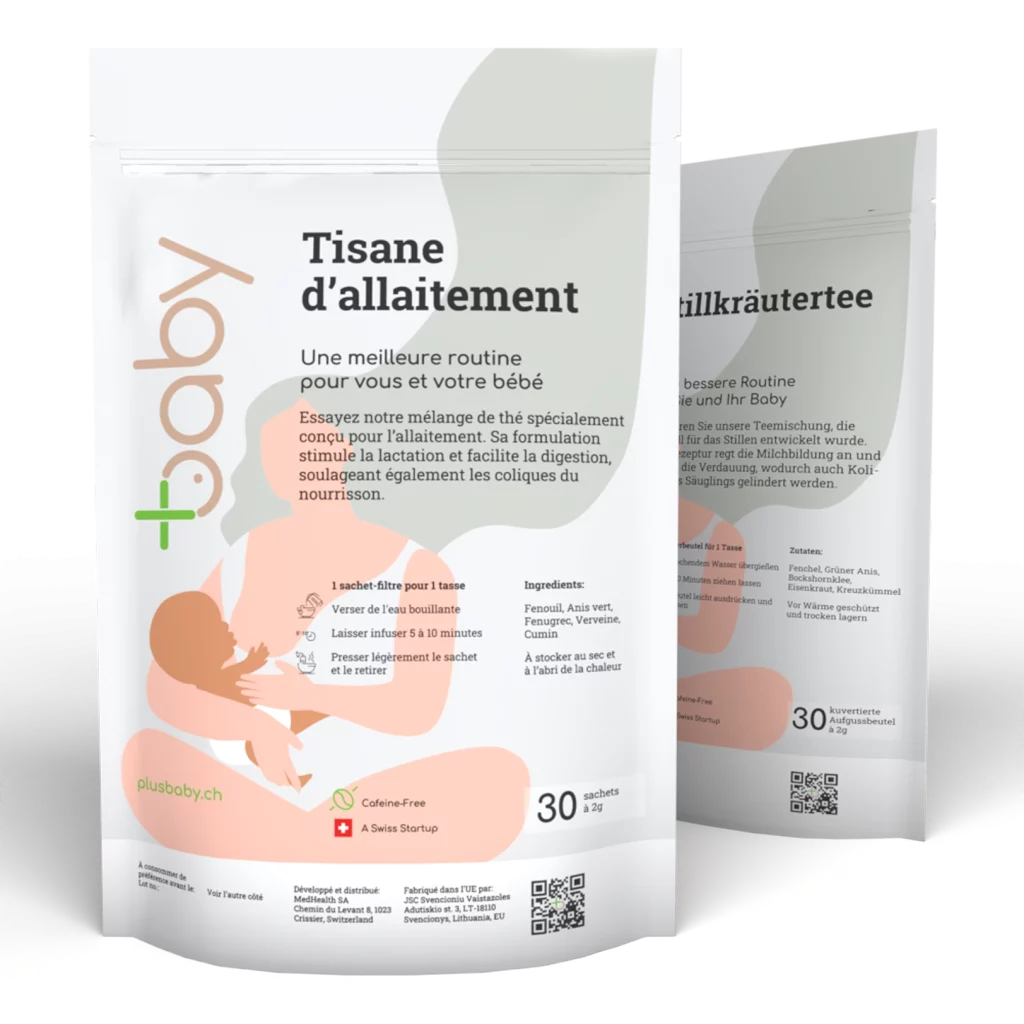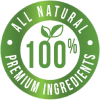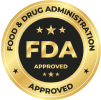🎁Recevez Une Boîte GRATUITE d'Oméga 3 Vegan DHA Pour Toute Commande De Plus De 50 CHF - Visitez Notre Shop !
3 for the price of 2! 🎁 Free delivery on all orders – Visit Our Shop!
Safe tea for breastfeeding: Breastfeeding is a key phase in the well-being of both mother and baby, requiring adequate nutrition and hydration. Breastfeeding teas play an essential role in this process. Enriched with herbs such as fennel and vervain, these teas aid digestion for both mother and baby. Fennel, for example, is known for its carminative properties, helping to reduce gas and colic in babies. These medicinal herbs work by stimulating the production of mother’s milk and improving its quality, which is beneficial for the baby’s digestion as they relieve colic. By avoiding caffeine and choosing herbal teas specially designed for breastfeeding, mothers can enjoy the benefits of these natural drinks without risk to their baby. These herbal teas, prepared by infusing herbs in boiling water, are a delicious and comforting way to nourish the body and mind during this important period.

Drinking enough fluids is the first prerequisite for good lactation. Breastfeeding Herbal Tea allows mums to stay well hydrated while enjoying a delicious herbal tea specially formulated for them and their babies. This flavour also passes into the milk, so the baby is even more eager to suckle, stimulating lactation all the more. You can drink as much as you like! There are several strategies you can adopt to help breastfeeding women achieve optimal lactation:
Balanced diet and hydration: Eat a varied, balanced diet rich in essential nutrients. Make sure you stay well hydrated by drinking plenty of fluids, especially water, caffeine-free herbal teas and natural juices.
Get enough rest and sleep: Lack of sleep can affect milk production. It’s important to get as much rest as possible and to sleep when your baby sleeps.
Frequent and regular breastfeeding: Breastfeeding often and at the baby’s request stimulates milk production. Baby’s suckling is a powerful signal for milk production.
Correct positioning and attachment: Ensuring that the baby is correctly positioned and attached to the breast can help to improve milk extraction and prevent breast soreness.
Use of a Breast Pump: If necessary, using a breast pump can help to maintain milk production, especially if the baby has difficulty suckling or if you need to be separated from your baby.
Avoid or limit supplements: Unless medically indicated, avoid giving supplements (such as formula) to the baby, as this can reduce the demand for breast milk and therefore production.
Galactagogic foods and herbs: Certain foods and herbs are reputed to promote lactation, such as fennel, fenugreek, oats and almonds.
Avoid stress and practise relaxation: Stress can have a negative effect on milk production. Practising relaxation techniques such as meditation, yoga or simply taking time out can be beneficial.
Consult a healthcare professional: If you have any difficulties or concerns about breastfeeding, it’s important to consult a doctor, midwife or lactation consultant.
Social and Emotional Support: Support from partners, family, friends and breastfeeding support groups can be a key factor in a successful breastfeeding experience.
It’s essential to remember that every woman and every breastfeeding experience is unique. What works for one person may not work for another. So it’s important to find what works best for your personal situation.
Breastfeeding teas, containing herbs such as fennel, vervain, lemon balm, aniseed, cumin, fenugreek and linden, play a crucial role in lactation and infant digestion. Fennel and cumin, rich in anethole and cuminaldehyde compounds, act as galactagogues, stimulating milk production. These compounds also have digestive benefits, helping to reduce gas and colic in infants. Lemon balm and verbena, with their calming and antispasmodic properties, promote healthy digestion. Aniseed and fenugreek, known for their galactogenic effects, improve the quality of breast milk, thus indirectly benefiting infant digestion. Linden, renowned for its relaxing action, helps to reduce stress, an important factor in efficient milk production. These herbs, used in herbal teas, offer a natural and safe solution to support the health of both mother and baby during this crucial period.
In the context of breastfeeding, precautions regarding herbal safe teas are essential to ensure the safety of both mother and baby. Caffeine, which is present in many teas and herbal teas, should be avoided as it can be transferred to the baby through breast milk, potentially influencing sleep and behaviour. It is therefore advisable to opt for caffeine-free herbal teas specially designed for breastfeeding. These herbal teas generally contain beneficial herbs such as fennel, aniseed and verbena, which support lactation and aid digestion, while being gentle on the baby’s digestive system. In addition, certain herbs can help to manage engorgement, a common problem during breastfeeding, thanks to their anti-inflammatory and relaxing properties, which facilitate the flow of milk and reduce discomfort. By choosing the right herbal teas, breastfeeding mothers can look after their health and that of their baby, while enjoying the natural, soothing benefits of medicinal plants.
Special care needs to be taken when consuming caffeine during breastfeeding. Caffeine, which is present in coffee, certain teas and energy drinks, can pass into breast milk and affect the infant. Effects such as irritability and sleep disturbances can occur in the baby if the mother consumes large quantities of caffeine. Current recommendations suggest limiting caffeine intake to a moderate level, which is generally considered safe for most breastfeeding mothers and their babies.
The issue of caffeine consumption during breastfeeding is approached cautiously by health experts. According to current recommendations, it is generally safe for breastfeeding mothers to consume up to 200 to 300 mg of caffeine a day. The Leche League International suggests that a daily intake of 2 cups of coffee (around 200 mg of caffeine) is safe during breastfeeding. The Centers for Disease Control and Prevention (CDC) in the United States recommends no more than 300 mg a day, or around 2 to 3 cups of coffee, depending on the size of the cup. It is important to note that some babies may be more sensitive to caffeine, particularly premature babies or newborns under the age of six months, due to their reduced ability to eliminate caffeine from their system.
Mothers are advised to monitor their baby’s behaviour and see if any changes are needed based on their caffeine intake. If a baby seems particularly irritable, restless or has problems sleeping, it may be helpful to reduce caffeine intake.
For more information, you can consult the resources of La Leche League International and What to Expect.
For breastfeeding mothers, there are many safe, caffeine-free herbal tea options that are beneficial for both mother and baby. Herbs such as fennel, aniseed, verbena and lemon balm are often recommended. These plants are known for their galactagogic properties, which stimulate milk production, and for their soothing effects on the baby’s digestive system. Fennel, in particular, is reputed to relieve colic in infants. Other herbs such as chamomile and lime blossom can offer relaxing benefits for the mother, helping to reduce stress and promote better lactation.
To maximise the benefits of breastfeeding herbal safe teas, it’s important to follow a few preparation and consumption guidelines. Here are some key steps:
By following this advice, you can make the most of the benefits of herbal teas during the breastfeeding period, ensuring the safety and health of yourself and your baby.
For in-depth, professional information on the use of medicinal plants during breastfeeding, including herbs such as fennel, verbena and others, here are two resources to use:
La Leche League International: A recognised organisation that provides information on breastfeeding and maternal health, including the use of herbal teas. Their website is an excellent source of information for breastfeeding mothers. Visit La Leche League International.
Drugs.com: This site offers information on medicines and supplements, including the effects of different herbs during breastfeeding. They provide information based on studies and medical journals. Visit Drugs.com.
Plusbaby’s breastfeeding herbal tea is specially formulated with ingredients such as fennel, aniseed, cumin, fenugreek and verbena. These ingredients have been chosen for their beneficial properties during breastfeeding, in particular for stimulating lactation and aiding digestion, as well as relieving colic in infants. This herbal tea aims to support the mother’s health and facilitate the breastfeeding process, while being gentle and beneficial for the baby. It is designed to be a natural and safe option for breastfeeding mothers.
Plusbaby breastfeeding tea is caffeine-free, making it safe for breastfeeding. It can be consumed up to four cups a day, providing welcome relief for mums and their babies.
Use: To prepare this herbal tea, pour boiling water over a sachet and leave to infuse for 5 to 10 minutes. It is recommended that you drink this tea every day during the breast-feeding period.

Safe tea for breastfeeding: In short, herbal teas during breastfeeding offer numerous health benefits for both mother and baby. Key ingredients such as fennel, vervain, aniseed and other herbs promote healthy lactation and aid digestion. Herbal teas specially formulated for breastfeeding, such as Plusbaby, are caffeine-free and therefore safe for the baby. They are a natural and effective alternative for breastfeeding mothers, helping to reduce stress and improve the quality of breast milk. These herbal teas are easy to prepare and can be drunk regularly to maximise their benefits. It is important to choose herbal teas formulated specifically for breastfeeding and to consult reliable resources such as La Leche League International or Drugs.com for detailed information on the use of medicinal plants during this period. Breastfeeding mothers are encouraged to choose natural and safe options, such as Plusbaby, to support their well-being and that of their baby.




PlusBaby resources are intended to provide general information and are not a substitute for professional medical advice, diagnosis or treatment.
Stay connected with Plusbaby. Sign up for a free e-book to understand your menstrual cycle and help you identify your most fertile period. You’ll also get early access to offers.
Who we are



@ 2025 by Plusbaby
@ 2025 by Plusbaby
